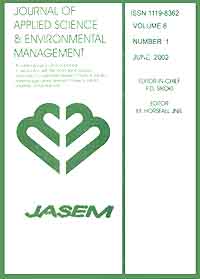
|
Journal of Applied Sciences and Environmental Management
World Bank assisted National Agricultural Research Project (NARP) - University of Port Harcourt
ISSN: 1119-8362
Vol. 22, No. 2, 2018, pp. 191-196
|
 Bioline Code: ja18034
Bioline Code: ja18034
Full paper language: English
Document type: Research Article
Document available free of charge
|
|
|
Journal of Applied Sciences and Environmental Management, Vol. 22, No. 2, 2018, pp. 191-196
| en |
Occurrence of organochlorine and organophosphorus pesticide residues in poultry feeds, raw and cooked eggs from selected farms in Ilala and Kibaha Districts, Tanzania
MAHUGIJA, JAM; CHIBURA, PE & LUGWISHA, EHJ
Abstract
This study assessed the levels of seventeen pesticides and metabolites residues in chicken feeds
and raw eggs as well as the effects of processing methods on the levels in eggs in samples obtained from six poultry
farms in Ilala and Kibaha districts, Tanzania. Extraction was performed by solid dispersion method and the extracts
were cleaned-up by adsorption column chromatography. The analytes were determined by Gas Chromatography–Mass Spectrometry (GC–MS). The highest mean concentrations of the contaminants in feeds and eggs were as
follows, respectively: aldrin 0.62 and 2 mg/kg, dieldrin 0.71 and 1.3 mg/kg, total DDT 6.68 and 8.14 mg/kg, total
endosulfan 3.53 and 3.74 mg/kg, total HCHs 0.91 and 1.21 mg/kg, chlorpyrifos 12.2 and 0.59 mg/kg, fenitrothion 4.9
and 0.64 mg/kg and pirimiphos methyl 22.11 and 1.6 mg/kg. Chicken feeds were found to be the most contaminated
followed by raw eggs and finally cooked eggs. Most of the concentrations were above the maximum residue limits
(MRLs) indicating risks and concerns. Proper selection and preparation of poultry feeds could reduce the levels in the
feeds and eggs.
Keywords
Pesticides; Chicken; Feed; Eggs; Tanzania
|
| |
© Copyright 2018 - Mahugija et al.
|
|
